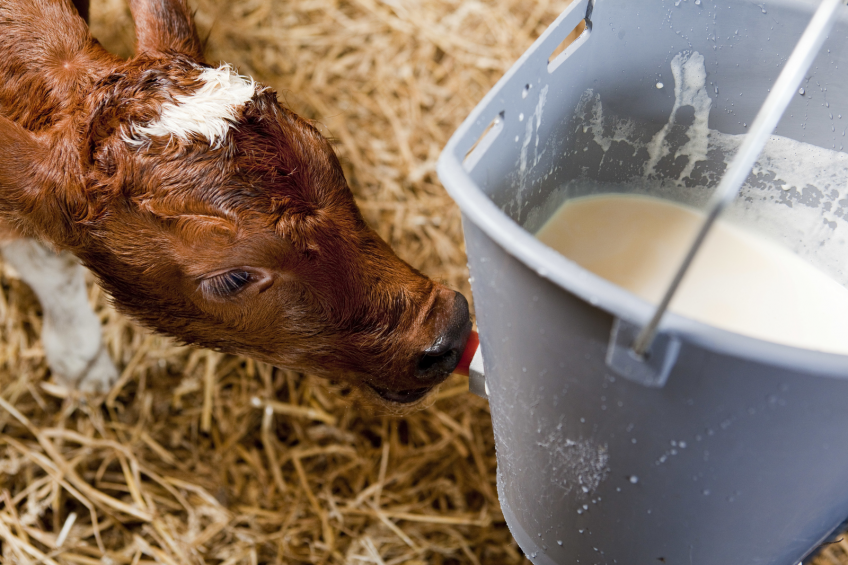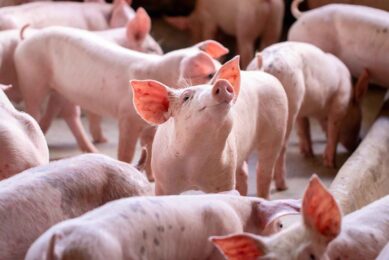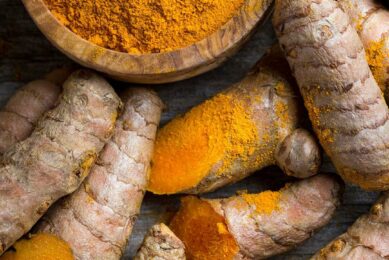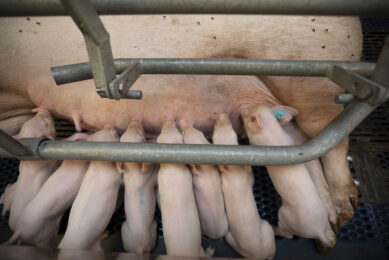Helping young ruminants fight against parasites

Parasites are one of the main causes of diarrhoea in calves and lambs, the responsible parasites being predominantly coccidia and cryptosporidia. Plant extracts have a general anti-inflammatory effect and can protect the overall health of the digestive tract in young ruminants.
Coccidia are frequently found on cattle and sheep farms. A Danish study involving 25 organic farms found coccidia in all herds and signs of coccidiosis in 88% of the calves examined. Parasites damage epithelial cells in the gut, thereby disturbing the normal absorption of nutrients and seriously impair the retention of fluids. This has long-term negative effects on growth. Coccidiosis is caused by eukaryote parasites of the genus Eimeria. Infections start with oral intake of Eimerian oocysts that then release sporozoites into the intestine. These invade cells in the gut wall where they multiply and finally release new oocysts with the faeces. Coccidia are transmitted from one animal to another mainly through faecal contamination. The parasite infection causes diarrhoea and fluid loss, and the infected animals usually show reduced appetite and poor growth.
Various prevention strategies have been proposed for cocci-diosis and cryptosporidiosis. The most frequently used strategies are management programmes, aimed at limiting the spread of parasites between animals. Firstly, animals should be born into a clean environment. Contact between animals should be minimised. All hutches should be thoroughly cleaned and dried, and preferably also left empty for a period between animals. Ensuring an adequate amount of high quality colostrum within six hours after birth has also been observed to reduce the severity of coccidiosis infections. During stressful periods, e.g. when young animals are bought and collected from different herds, measures for strengthening the immune response are recommended.
Nutritional programmes that are used when diarrhoea is observed include supplying extra electrolytes, vitamins and carbohydrates in a solution to prevent dehydration. Coccidiosis often occurs in subclinical form, suggesting that for every treated animal in a group, there are several other animals that are infected but not showing any symptoms. The biggest economic cost of parasite infections is impaired growth. The weight gain lost due to subclinical infections can therefore become a large hidden cost.
Extra capabilities of plant extracts
Lately there has been renewed focus on the use of plant extracts as a means of reducing diarrhoea caused by parasites. Many plant extracts have been investigated and found capable of reducing inflammation and improving the health of the digestive tract. Garlic and anethole have been shown to boost anticoccidial activity, as seen in reduced numbers of oocysts in the faeces. The lower output of oocysts indicates that these plant extracts interfere with the parasite’s development in the digestive tract. The anti-inflammatory properties were also demonstrated in garlic preventing histopathological changes in the liver (Figure 1).
Figure 1 – Protective role of garlic against infection with Eimeria papillata in hepatic tissue in mice.
(A) Non-infected tissue.
(B) Infected tissue, showing inflammatory cellular infiltration.
(C) Liver treated with garlic extract with lowered inflammation and damage (Dkhil et al., 2010).

Peppermint or Mentha extract exhibits antioxidant properties and inhibition of lipid peroxidation. This has been demonstrated in trials where Mentha extract increased villus height, number of total cells and mitiotic cells in the intestine whereas dead cells were decreased compared with irradiated controls.
Liquorice extract is rich in anethole, which has a direct effect on internal parasites as demonstrated in a 45% reduction in viability of invasive Eimeria acervulina sporozytes after two hours in vitro. Consequently body weight gain was higher and oocyst secretion lower for the anethole supplemented group. Here it was concluded that dietary anethole enhances systemic immunity in chickens and increases local protective immunity against experimental avian coccidiosis.
There are several indications that many plant extracts have a general anti-inflammatory effect and that they protect tissues and thereby the overall health of the digestive tract. Vitcox from Vilofoss is a mix of several plant extracts, including allicin, anethole and rosmarinic acid. Supplementation rate is 0.7 ml per head per day for calves and lambs. In studies done at the University of Rennes in France, Vitcox inhibited development of coccidia in vitro.
Preliminary results in sheep
The Southwest Sheep Breeders’ organisation in Denmark is currently testing the efficacy of the product in sheep. The motivation for the organisation to test this product is:
- The product is an antiparasitic that does not require faecal egg counts before use.
- The product can be purchased without prescription.
- Using the product sends consumers and stakeholders a signal of willingness to reduce medication.
The animals in the trial herd were split into a control group and a group supplemented with the additive. Each group consisted of seven or eight lambs and four sheep. All animals were housed indoors. In this trial the coccidiosis level in the ewes was so low that they did not receive any treatments. The lambs were weighed every 14 days starting at two weeks from birth. Faecal samples were collected at one month of age and thereafter every 14 days.
Here it was observed that the plant extract product reduced the number of oocysts considerably (Figure 2). By reducing the infection pressure, the digestive tract will remain healthier and have a higher capacity for nutrient absorption. In this trial the weight gain during a 46 day period was increased by 11% (Figure 3). In summary, a combination of plant extracts can be used as an effective prevention strategy for diarrhoea caused by parasites.
References available on request.











